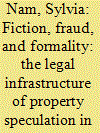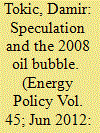| Srl | Item |
| 1 |
ID:
173414


|
|
|
|
|
| Summary/Abstract |
Through the standardization of property as a commodity, real estate speculation in Phnom Penh has flourished and has included foreigners, for whom Cambodian real estate property is constitutionally off-limits. This essay outlines some features of Cambodian law to highlight the contours of the country’s deep legal pluralism, as well as to describe how law is part of the way property has been remade as a market commodity. “Legal fictions” – technical devices and shell companies – give access to Phnom Penh’s real estate market. The use of legal fictions in Cambodia’s economy is widespread and, crucially, structures property ownership and its distribution. In the process these devices work to veil ownership in plain sight and skew access to property to those who can utilize this effectively.
|
|
|
|
|
|
|
|
|
|
|
|
|
|
|
|
| 2 |
ID:
156690


|
|
|
|
|
| Summary/Abstract |
In the aftermath of the 2008 global financial crisis, luxurious mega-casino resorts have become spectacles of economic growth across diverse destinations in Asia. With its emphasis on large-scale integrated resorts (IR), the casino and leisure industry is a site of economic rejuvenation even as it offers spaces of moral corruption. Integrated mega-casinos are ambiguous projects of development, driving the speculative processes of place-making for accumulation, social control, and global competition. This editorial introduction focuses on three main themes. First, mega-IR projects show the historical and complicated relations between state power and the gambling economy. Second, Southeast Asia’s new mega-casinos are emblematic of speculative urbanism and its experiments. Third, casino-as-development consolidates the differentiated treatment of citizen subjects and gives legitimacy to the biopolitical governance of citizen practices, claims, and urban participation.
|
|
|
|
|
|
|
|
|
|
|
|
|
|
|
|
| 3 |
ID:
101381


|
|
|
|
|
| Publication |
2011.
|
| Summary/Abstract |
I hypothesize that the price spike and collapse of 2007-2008 are driven by both changes in both market fundamentals and speculative pressures. Contrary to arguments for a demand shock, I hypothesize that prices rise sharply in 2007-2008 because ongoing growth in Chinese oil demand runs into a sudden and unexpected halt to a decade long increase in non-OPEC production. This caused a loss of OPEC spare capacity because increased demand for OPEC production runs ahead of increases in OPEC capacity. These changes are reinforced by speculative expectations. Although difficult to measure directly, I argue for the role of speculation based on the following: (1) a significant increase in private US crude oil inventories since 2004; (2) repeated and extended break-downs (starting in 2004) in the cointegrating relationship between spot and far month future prices that are inconsistent with the law of one price and arbitrage opportunities; and (3) statistical and predictive failures by an econometric model of oil prices that is based on market fundamentals. These changes are related to the behavior and impact of noise traders on asset prices to sketch mechanisms by which speculative expectations can affect crude oil prices.
|
|
|
|
|
|
|
|
|
|
|
|
|
|
|
|
| 4 |
ID:
113466


|
|
|
|
|
| Publication |
2012.
|
| Summary/Abstract |
This article analyzes the CFTC's Disaggregated Commitments of Traders (DCOT) Report to get more insights into the behavior of different traders during the 2008 oil bubble. The analysis shows that: (1) the Money Manager category perfectly played the oil bubble, got in early and started selling shortly before the bubble peak; (2) the Producer/Merchant/Processor/User category and the Nonreportable category were covering their short positions into the peak of the bubble; (3) the Swap/Dealer category benefited while the price of oil was rising, but incurred heavy losses as the price of oil collapsed; (4) we find no indications of speculation by any group of traders via the positive feedback trading or rational destabilization; and (5) we do, however, criticize the commercial hedgers for failing to arbitrage the soaring oil prices in 2008.
|
|
|
|
|
|
|
|
|
|
|
|
|
|
|
|